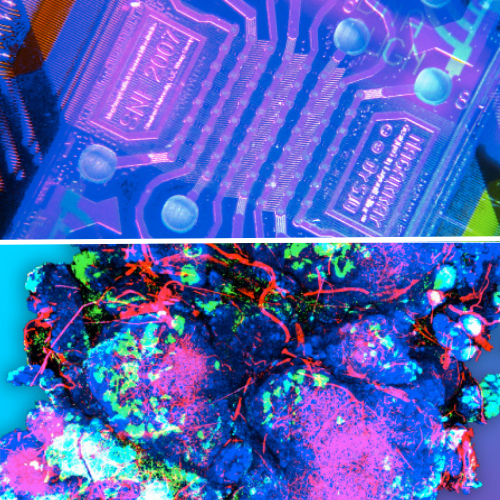History of Cancer TEC
Three workshops have been sponsored by the NCI to assess the status of tissue-engineered systems in cancer and to identify gaps. In April 2012, a Physical Sciences – Oncology Network (PS-ON) workshop was held to discuss areas where physical sciences principles from tissue engineering and developmental biology could open new avenues in cancer research. Participants highlighted the need for development of synthetic in vitro and ex vivo engineered systems to better probe key factors in tissues and their microenvironment important in cancer. The consensus of the participants was that these factors could be best studied in physiologically relevant and controlled tissue-engineered systems.
To further explore the status of tissue-engineered technologies in cancer, a second targeted PS-ON workshop on Biomimetic Tissue Engineered Systems for Advancing Cancer Research was held in February 2014. The workshop highlighted examples of how tissue-engineered technologies are currently being applied to cancer research to study angiogenesis, migration, and therapeutic resistance. Workshop participants identified areas for future focus based on existing research and gaps in cancer biology.
Finally, in April 2015, a joint workshop was held with the National Science Foundation on Additive Manufacturing for Tumor Engineering. The workshop highlighted several barriers to constructing tissue-engineered systems for cancer research, including the need for their robust pathophysiological characterization. Participants recommended the formation of multidisciplinary partnerships to construct and characterize tissue-engineered models of cancer. It was suggested that characterization of systems could include, but not be limited to, biological comparisons of in vivo and clinical datasets.
Cancer TEC News
Dr. Michael King et al. developed a multiplex, high-throughput approach using a multichannel pipetting device to study cancer and immune cell mechanotransduction during metastasis.
In describing the new system, he said, “We hope that this new approach for performing higher throughput mechanobiology research on suspended cells will be useful to the research community.”
Cancer TEC Associate Membership
The goal of the Cancer TEC Associate Membership program is to provide an opportunity for those who are not currently funded by the Cancer TEC program to engage in Cancer TEC activities and potentially form collaborations with Cancer TEC funded investigators. Additional information, including eligibility, expectations of Cancer TEC Associate Members, and the application form, can be found on the Cancer TEC Associate Membership webpage.
Contact for Cancer TEC
For additional information about the TEC, please contact Dr. Eric Johnson Chavarria.
Funded Projects
Associate Members
| Institution | Associate Member |
|---|---|
| Children's Hospital Los Angeles | Meenakshi Upreti |
| Cornell University | Mingming Wu |
| Drexel University | Xiao Huang |
| Duke University | Wonjae Lee |
| Emory University/Georgia Tech | Vahid Serpooshan |
| Harvard University | David J. Mooney |
| Harvard University | Jennifer Lewis |
| Illinois Institute of Technology | Abhinav Bhushan |
| Lawrence Livermore National Laboratory | Claire Robertson |
| LivMira Therapeutics Inc. | Dileep Radhamony Amma |
| Mayo Clinic | John A. Copland |
| MD Anderson Cancer Center | Xiling Shen |
| New York Institute of Technology | Karrer Alghazali |
| Northwestern University | Xiao-Nan Li |
| San Diego State University | Mauro Tambasco |
| Sanford Burnham Prebys | Kevin Tharp |
| Shahid Beheshti University | Mehrnaz Mostafavi |
| St. Jude Children's Research Hospital | Anand G. Patel |
| Stanford University | Ovijit Chaudhuri |
| Terasaki Institute | Ali Khademhosseini |
| Texas A&M University | Akhilesh Gaharwar |
| Texas A&M University | Shreya A. Raghavan |
| University of Alabama | Shreyas S. Rao |
| University of Arizona | Alexander J. McGhee |
| University of California, San Diego | Shaochen Chen |
| University of Louisville | Robert C.G. Martin |
| University of Maryland | Xiaoming (Shawn) He |
| University of Michigan | Geeta Mehta |
| University of Minnesota | Darko Bosnakovski |
| University of New South Wales | Kristopher A. Kilian |
| University of Texas at Austin | Marissa N. Rylander |
| University of Texas at Dallas | Jacopo Ferruzzi |
| University of Texas Southwestern Medical Center | Emina H. Huang |
| University of Wisconsin-Madison | Pamela Kreeger |
| Washington University | Eduardo Rosa-Molinar |
Past Projects
